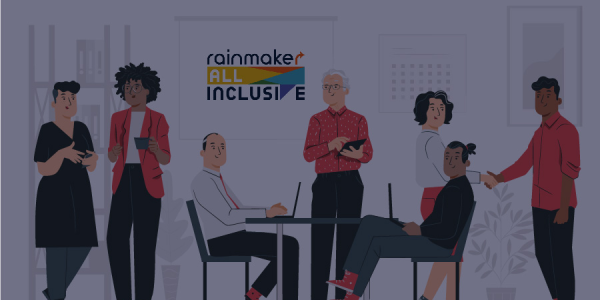Diversity, Equity, and Inclusion (DEI) are critical concepts that organizations must prioritize to be preferred employers for today’s talent. Practices and policies in the area of DEI are aimed at promoting equal treatment, respect, and opportunity for individuals from diverse backgrounds, regardless of their gender, race, ethnicity, sexual orientation, religion, disability, or any other characteristic.
Diversity means acknowledging and valuing differences in people's backgrounds, experiences, and perspectives. Inclusion involves creating an environment where people feel valued, respected, and supported, regardless of their differences. Equity, on the other hand, refers to ensuring that everyone has equal access to opportunities and resources, regardless of their background or identity.
Implementing DEI initiatives can bring numerous benefits to organizations, such as improved employee morale, increased creativity, better decision-making, and enhanced innovation. A diverse and inclusive workplace can attract and retain top talent, enhance customer satisfaction, and ultimately drive business success.
One of the most crucial aspects of DEI involves creating a safe workplace for all employees. In the context of female employees, therefore, interventions that lead to prevention of sexual harassment become a critical area of focus. Preventing sexual harassment requires a proactive approach that includes policy development, training, and enforcement. Organizations must develop clear policies and procedures that prohibit sexual harassment in all forms and provide a safe and confidential reporting mechanism for employees who experience or witness such behaviour. The policy should also provide a clear definition of what constitutes sexual harassment and the consequences for violating the policy.
Training is crucial to ensure that all employees understand what sexual harassment is, why it is wrong, and how to prevent it. This training should include practical examples of inappropriate behavior and what to do if they experience or witness it. It should also emphasize the importance of respect, professionalism, and diversity in the workplace.
Enforcement is essential to ensure that policies are followed, and violators are held accountable. Managers and supervisors should receive additional training to recognize and respond to incidents of sexual harassment appropriately. Employees should feel confident that they will not face retaliation for reporting inappropriate behavior.
Overall, preventing sexual harassment requires a commitment from everyone in the organization to create a safe and respectful workplace culture. By developing clear policies, providing training, and enforcing these policies, organizations can reduce the incidence of sexual harassment and create a more productive and inclusive work environment.
In India, the Sexual Harassment at Workplace (Prevention, Prohibition, and Redressal) Act, 2013, and its associated rules which mandates that every employer provide a safe working environment for their employees, free from sexual harassment. Employers must also conduct awareness programs and training sessions to educate employees about the mandates under the PoSH Act and regarding the respective policies and practices in the organization targeted at the prevention of sexual harassment.
However, the PoSH mandates should not be viewed simply as a matter of compliance. Proper implementation of the PoSH policy is intricately tied to creating a workplace that is diverse, inclusive and equitable. Such an implementation creates a workplace that is free of discrimination and harassment, ensuring diversity. PoSH promotes equity by ensuring that female employees are able to further their careers without the fear of being tied down by harassment. It also fosters a culture of inclusion by encouraging and creating channels for open and respectful communication between employees. Here, we suggest best strategies that would allow the effective implementation of PoSH policies that would help make your organization more diverse, inclusive and equitable:
1) Regular training workshops:
It is crucial to regularly organize training workshops for employees to prevent and identify instances of sexual harassment at the workplace. Such training empowers employees to speak up when they witness inappropriate behavior and ensures that female employees feel supported and remain aware of how to seek help. Regular training workshops can create a positive, respectful, and inclusive workplace.
2) The Internal Committee:
The PoSH Act mandates the formation of an Internal Committee (IC) to address and adjudicate claims of potential sexual harassment. Members of the IC and other HR personnel must receive sensitivity and legal training to effectively investigate and adjudicate disputes. Organizations should ensure that employees have easy access to the IC through email, complaint boxes, or helpline numbers.
3) Institutional Support:
The DEI Policy must provide institutional support to female employees to deal with sexual harassment at the workplace. This can be in the form of creating ‘safe spaces’ and setting up an ‘office therapist’ to help survivors navigate their trauma.4) Gathering Feedback:
The organization must have a feedback system in place to assess the effectiveness of its internal mechanism. Anonymous surveys among female employees can be conducted to gauge the ‘employee pulse’ and identify areas for improvement.
5) Creation of Gender-Neutral Policies:
While not legally mandated in India, creating a gender-neutral policy against sexual harassment at the workplace would foster a sense of responsibility and elevate all employees as stakeholders in maintaining a safe and inclusive workplace.
DEI initiatives have proved to be successful in remedying sexual harassment at the workplace. Below are a few such success stories:
1) Uber- In 2017, ride-hailing giant Uber faced a major scandal when several female employees accused male colleagues of sexual harassment. In response, Uber appointed Bo Young Lee as its first Chief Diversity and Inclusion Officer. Lee devised a comprehensive plan to combat workplace harassment, which included training sessions, employee surveys, and an anonymous hotline for reporting incidents. Uber also hired an independent investigator to look into harassment claims and implemented a system to track and report incidents.
2) Intel- In 2015, technology firm Intel announced a bold plan to increase diversity and inclusion within its workforce. As part of this effort, the company created a program to train all employees on preventing harassment and discrimination. Intel also established an Employee Diversity and Inclusion Group, which helps employees report incidents of harassment and provides support for victims.
3) Google- In 2018, Google employees staged a walkout in response to the company's mishandling of sexual harassment claims. In response, Google implemented several policy changes, including the elimination of forced arbitration in harassment and discrimination cases, and the establishment of a reporting hotline and a support system for employees who experience harassment.
In conclusion, sexual harassment is a significant obstacle to achieving the goals of DEI initiatives. It is evident that a significant part of creating a diverse, inclusive, and equitable workplace depends on the effective implementation of the provisions of the PoSH Act and its Rules. Therefore, it is essential to ensure that your DEI policy aligns with the objectives of these laws to establish truly diverse and inclusive workplaces. By taking proactive measures, organizations can create safe and supportive work environments where all employees feel valued and respected.
Author: Kevin Davis, Research Associate, Law, Rainmaker
Disclaimer : No information contained in this website may be reproduced, transmitted, or copied (other than for the purposes of fair dealing, as defined in the Copyright Act, 1957) without the express written permission of Rainmaker Online Training Solutions Pvt. Ltd.











